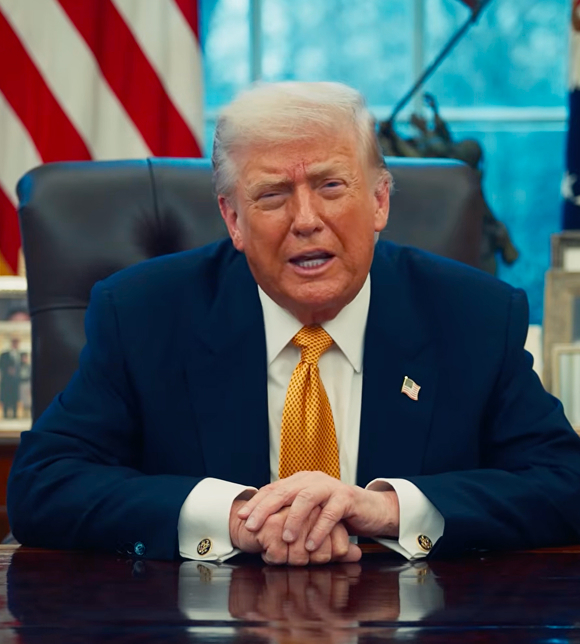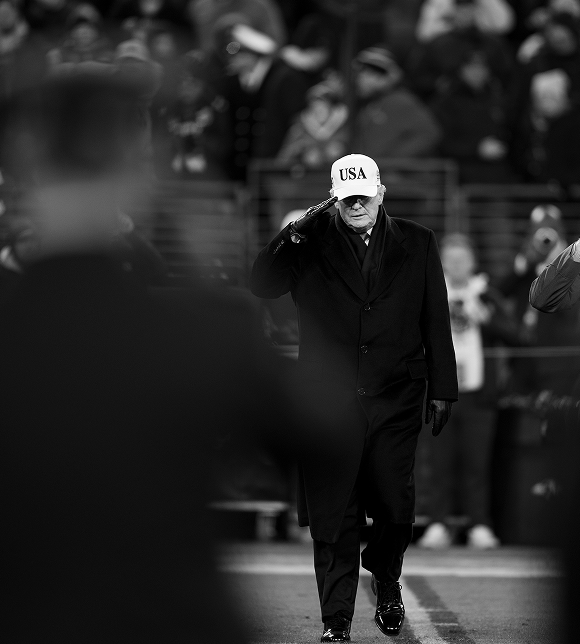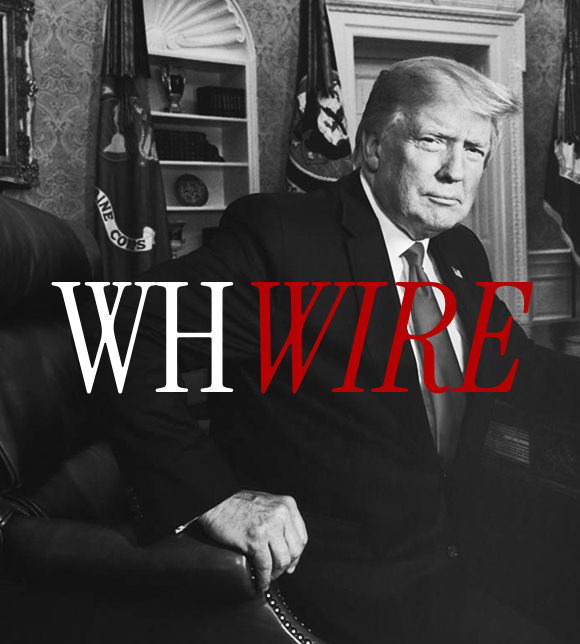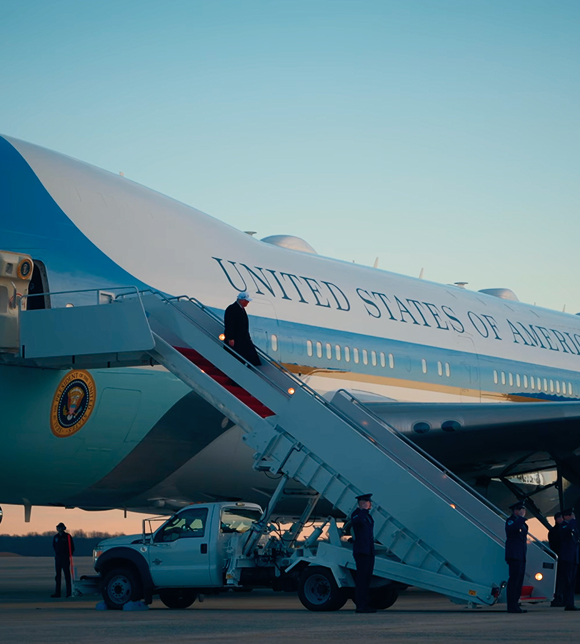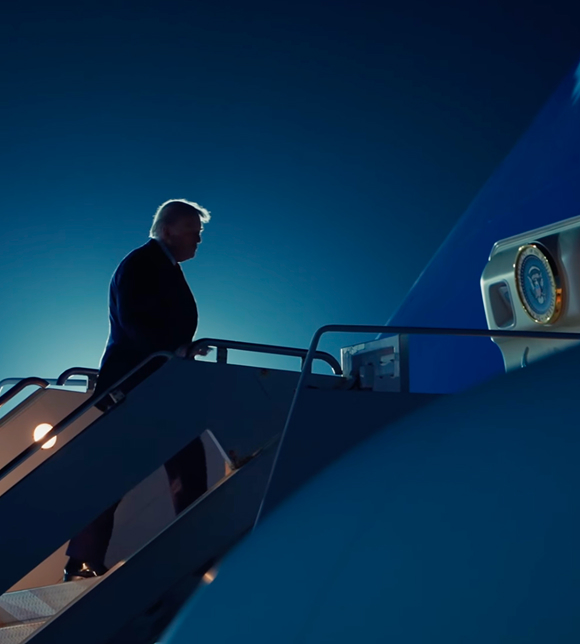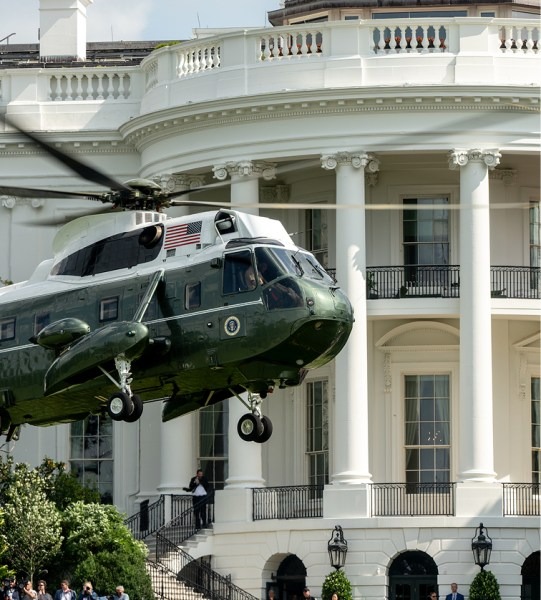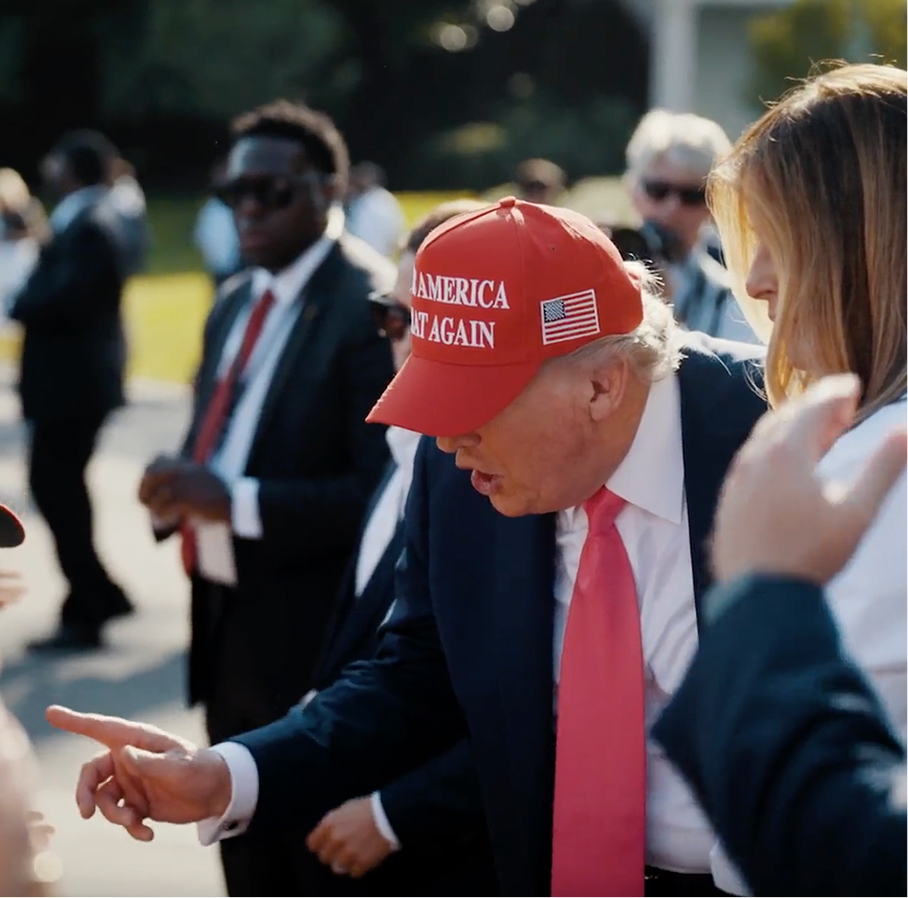BY THE PRESIDENT OF THE UNITED STATES OF AMERICA
A PROCLAMATION
1. On June 30, 2025, the Secretary of Commerce (Secretary) transmitted to me a report on his investigation into the effects of imports of copper in all forms (copper), including copper ores, copper concentrates, refined copper, copper alloys, scrap copper, and derivative products, on the national security of the United States under section 232 of the Trade Expansion Act of 1962, as amended, 19 U.S.C. 1862 (section 232). Based on the facts considered in that investigation, the Secretary found and advised me of his opinion that copper is being imported into the United States in such quantities and under such circumstances as to threaten to impair the national security of the United States.
2. The Secretary found that the present quantities of copper imports and the circumstances of global excess capacity for producing copper are weakening our economy, resulting in the persistent threat of further closures of domestic copper production facilities and the shrinking of our ability to meet national security production requirements. Because of these risks, and taking into account the close relation of the economic welfare of the Nation to our national security and other relevant factors, see 19 U.S.C. 1862(d), the Secretary found that the present quantities and circumstances of copper imports threaten to impair the national security as provided in section 232.
3. In reaching this conclusion, the Secretary found that copper is essential to the manufacturing foundation on which United States national and economic security depend. Copper is the second most widely used material by the Department of Defense and is a necessary input in a range of defense systems, including aircraft, ground vehicles, ships, submarines, missiles, and ammunition. Copper also plays a central role in the broader United States industrial base. The metal’s exceptional electrical conductivity and durability also make it indispensable to critical infrastructure sectors that support the American economy, national security, and public health. Alternatives to copper are insufficient substitutes for these vital industries and products in many circumstances.
4. The Secretary found that the United States was a world leader across the value chain of copper production (mining, refining, semi-finished goods, and finished goods containing copper) for most of the 20th century. But despite copper being a crucial material in manufacturing and for the national and economic security of the United States, United States copper production has plummeted. Today, a single foreign country dominates global copper smelting and refining, controlling over 50 percent of global smelting capacity and holding four of the top five largest refining facilities.
5. The Secretary found that unfair trade practices abroad, exacerbated by overly burdensome environmental regulations at home, have hollowed out United States copper refining and smelting, caused the United States to be overly reliant on foreign copper imports, and prevent a path forward without strong corrective action. Foreign competitors leverage state subsidies and overproduction to flood international markets with artificially low-priced copper products, driving United States producers out of business. The United States is now dangerously dependent on foreign imports of semi-finished copper, intensive copper derivative products, and copper-containing products, and imbalances in the global markets make domestic investment increasingly unviable.
6. The Secretary found that United States dependency on foreign sources of copper is a national security vulnerability that could be exploited by foreign countries, weakens United States industrial resilience, exposes the American people to supply chain disruptions, economic instability, and strategic vulnerabilities, and jeopardizes the United States defense industrial base.
7. In light of these findings, the Secretary recommended a range of actions to adjust the imports of copper so that such imports will not threaten to impair the national security. For example, the Secretary recommended an immediate universal 30 percent import duty on semi-finished copper products and intensive copper derivative products. The Secretary also recommended a phased universal tariff on refined copper of 15 percent starting in 2027 and 30 percent starting in 2028. The Secretary further recommended a domestic sales requirement for copper input materials starting at 25 percent in 2027, a domestic sales requirement of 25 percent for high-quality copper scrap, and export controls for high-quality copper scrap.
8. After considering the Secretary’s report, the factors in section 232(d), 19 U.S.C. 1862(d), and other relevant factors, among other things, I concur with the Secretary’s finding that copper is being imported into the United States in quantities and under circumstances that threaten to impair the national security of the United States. In my judgment, and in light of the Secretary’s report, the factors in section 232(d), 19 U.S.C. 1862(d), and other relevant factors, among other things, I also determine that it is necessary and appropriate to impose tariffs, as described below, to adjust imports of copper and its derivatives so that such imports will not threaten to impair the national security of the United States.
9. To ensure that the tariffs on copper in this proclamation are not circumvented and that the purpose of this action to address the threat to impair the national security of the United States posed by imports of copper is not undermined, I also deem it necessary and appropriate to set up a process to identify and impose tariffs on certain derivatives of copper, as further described below.
10. In my judgment, the action in this proclamation will, among other things, help increase domestic production of semi-finished copper products and intensive copper derivative products, thereby reducing our Nation’s reliance on foreign sources. It will ensure that domestic fabricators are able to supply sufficient quantities of copper products essential for infrastructure, defense systems, and advanced manufacturing. This action will also promote investment, employment, and innovation in the domestic copper fabrication sector, strengthen supply chains, enhance industrial resilience, and generate meaningful economic benefits. This action will adjust the imports of semi-finished copper products, intensive copper derivative products, and certain other copper derivatives and is necessary and appropriate to address the threat to impair the national security of the United States posed by imports of such articles.
11. Section 232 authorizes the President to adjust the imports of an article and its derivatives that are being imported into the United States in such quantities or under such circumstances as to threaten to impair the national security so that such imports will not threaten to impair the national security.
12. Section 604 of the Trade Act of 1974, as amended, 19 U.S.C. 2483, authorizes the President to embody in the Harmonized Tariff Schedule of the United States (HTSUS) the substance of statutes affecting import treatment, and actions thereunder, including the removal, modification, continuance, or imposition of any rate of duty or other import restriction.
13. Consistent with the General Terms for the United States of America and the United Kingdom of Great Britain and Northern Ireland Economic Prosperity Deal (May 8, 2025), the United States intends to coordinate with the United Kingdom to adopt a structured, negotiated approach to addressing the national security threat in the copper sector.
NOW, THEREFORE, I, DONALD J. TRUMP, President of the United States of America, by the authority vested in me by the Constitution and the laws of the United States of America, including section 232; the International Emergency Economic Powers Act (50 U.S.C. 1701 et seq.); section 101 of the Defense Production Act of 1950 (DPA), as amended, 50 U.S.C. 4511; section 301 of title 3, United States Code; and section 604 of the Trade Act of 1974, as amended, 19 U.S.C. 2483, do hereby proclaim as follows:
(1) Except as otherwise provided in this proclamation, all imports of semi-finished copper products and intensive copper derivative products, as set forth in the Annex to this proclamation, shall be subject to a 50 percent tariff. This tariff shall be effective with respect to goods entered for consumption, or withdrawn from warehouse for consumption, on or after 12:01 a.m. eastern daylight time on August 1, 2025, and shall continue in effect, unless such action is expressly reduced, modified, or terminated. This tariff is in addition to any other duties, fees, exactions, and charges applicable to such imported semi-finished copper products and intensive copper derivative products, unless stated otherwise below.
(2) The Secretary, in consultation with the United States International Trade Commission and U.S. Customs and Border Protection (CBP), shall determine whether any modifications to the HTSUS are necessary to effectuate this proclamation and shall make such modifications through notice in the Federal Register if needed.
(3) Within 90 days after the date of this proclamation, the Secretary shall establish a process for including additional derivative copper articles within the scope of the duties of this proclamation, consistent with the processes established pursuant to Proclamation 10895 of February 10, 2025 (Adjusting Imports of Aluminum Into the United States) and Proclamation 10896 of February 10, 2025 (Adjusting Imports of Steel Into the United States).
(4) The non-copper content of all copper articles subject to this proclamation shall be subject to tariffs pursuant to Executive Order 14257 of April 2, 2025 (Regulating Imports With a Reciprocal Tariff To Rectify Trade Practices That Contribute to Large and Persistent Annual United States Goods Trade Deficits), and any other applicable duties, including those imposed by Executive Order 14193 of February 1, 2025 (Imposing Duties To Address the Flow of Illicit Drugs Across Our Northern Border), as amended, Executive Order 14194 of February 1, 2025 (Imposing Duties To Address the Situation at Our Southern Border), as amended, and Executive Order 14195 of February 1, 2025 (Imposing Duties To Address the Synthetic Opioid Supply Chain in the People’s Republic of China), as amended. The additional duties described in clauses 1 through 3 of this proclamation shall apply only to the copper content of articles subject to this proclamation. CBP shall issue authoritative guidance mandating strict compliance with declaration requirements for copper content in imported articles and outlining maximum penalties for noncompliance, including that importers who submit underreported declarations may be subject to severe consequences, such as significant monetary penalties, loss of import privileges, and criminal liability, consistent with United States law.
(5) If any product is subject to tariffs under both this proclamation and Proclamation 10908 of March 26, 2025 (Adjusting Imports of Automobiles and Automobile Parts Into the United States), as amended, the product shall be subject to the duties imposed pursuant to Proclamation 10908, as amended, and not those imposed pursuant to this proclamation.
(6) Any product described in clause 1 of this proclamation, except those eligible for admission as “domestic status” as described in 19 CFR 146.43, that is subject to a duty imposed by this proclamation and that is admitted into a United States foreign trade zone on or after the effective date of this proclamation must be admitted as “privileged foreign” status as described in 19 CFR 146.41, and will be subject upon entry for consumption to any ad valorem rates of duty related to the classification under the applicable HTSUS subheading.
(7) The Secretary shall continue to monitor imports of copper and its derivatives. The Secretary shall, from time to time, in consultation with any senior executive branch officials the Secretary deems appropriate, review the status of copper and copper derivative imports with respect to national security. The Secretary shall inform the President of any circumstances that, in the Secretary’s opinion, might indicate the need for further action by the President under section 232. By June 30, 2026, the Secretary shall provide the President with an update on domestic copper markets, including refining capacity and the market for refined copper in the United States, so that the President may determine whether imposing a phased universal import duty on refined copper of 15 percent starting on January 1, 2027, and 30 percent starting on January 1, 2028, as recommended by the June 30, 2025, report, is warranted to ensure that copper imports do not continue to threaten to impair the national security. The Secretary shall also inform the President of any circumstance that, in the Secretary’s opinion, might indicate that the duty rate provided for in this proclamation, or any actions modifying this proclamation, is no longer necessary.
(8) Separately, I find that copper input materials and high-quality copper scrap meet the criteria specified in section 101(b) of the DPA, 50 U.S.C. 4511(b). Pursuant to the authority delegated to the Secretary in Executive Order 13603 of March 16, 2012 (National Defense Resources Preparedness), the Secretary shall take all appropriate action to implement the domestic sales requirements that he recommended in the June 30, 2025, report.
(9) The Secretary may issue regulations, rules, guidance, and procedures consistent with the purpose of this proclamation, including to address operational necessity.
(10) No drawback shall be available with respect to the duties imposed pursuant to this proclamation.
(11) CBP may take any necessary or appropriate measure to administer the tariff imposed by this proclamation.
(12) Any provision of previous proclamations and Executive Orders that is inconsistent with the actions taken in this proclamation is superseded to the extent of such inconsistency. If any provision of this proclamation, or the application of any provision to any individual or circumstance, is held to be invalid, the remainder of this proclamation and the application of its provisions to any other individuals or circumstances shall not be affected.
IN WITNESS WHEREOF, I have hereunto set my hand this thirtieth day of July, in the year of our Lord two thousand twenty-five, and of the Independence of the United States of America the two hundred and fiftieth.
DONALD J. TRUMP
Semi-Finished Copper and Intensive Copper Derivatives Annex:
- Effective with respect to goods entered for consumption, or withdrawn from warehouse for consumption, on or after 12:01 a.m. eastern time on August 1, 2025:
- The following new U.S. note 36 to subchapter III of chapter 99 of the Harmonized Tariff Schedule of the United States (HTSUS) is inserted in numerical order:
“(a) Heading 9903.78.01 provides the ordinary customs duty treatment of semi-finished copper and intensive copper derivative products, as enumerated in subdivision (b) of this note, of all countries.
For any such products that are eligible for special tariff treatment under any of the free trade agreements or preference programs listed in general note 3(c)(i) to the tariff schedule, the duty provided in heading 9903.78.01 shall be collected in addition to any special rate of duty otherwise applicable under the appropriate tariff subheading. Goods for which entry is claimed under a provision of chapter 98 and which are subject to the additional duties prescribed herein shall be eligible for and subject to the terms of such provision and applicable U.S. Customs and Border Protection (‘‘CBP’’) regulations, except that duties under subheading 9802.00.60 shall be assessed based upon the full value of the imported article. No claim for entry or for any duty exemption or reduction shall be allowed for the semi-finished copper and intensive copper derivative products enumerated in subdivision (b) of this note under a provision of chapter 99 that may set forth a lower rate of duty or provide duty-free treatment, taking into account information supplied by CBP, but any additional duty prescribed in any provision of this subchapter or subchapter IV of chapter 99 shall be imposed in addition to the duty in heading 9903.78.01. All antidumping, countervailing, or other duties and charges applicable to such goods shall continue to be imposed in addition to the duty in heading 9903.78.01.
For any semi-finished copper or intensive copper derivative product that is classified in one of the headings or subheadings of the HTSUS that is listed in subdivision (b) of this note, the additional ad valorem duty imposed by heading 9903.78.01 shall only apply to the declared value of the copper content of the article. The quantity of the copper content shall be reported in kg for heading 9903.78.01, in addition to the units provided in chapters 1 through 97 for the copper article, in accordance with statistical note 1(b) of chapter 99.
(b) The rates of duty set forth in heading 9903.78.01 apply to the copper content of all imported semi-finished copper and intensive copper derivative products, as specified in subdivision (a) to this note, that are classified in the provisions of the HTSUS enumerated in this subdivision:
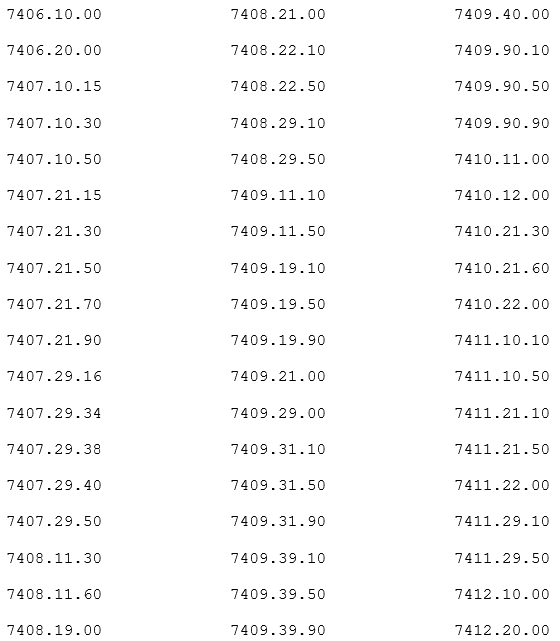

(c) Heading 9903.78.02 applies to the non-copper content of all entries classifiable under provisions of the HTSUS enumerated in subdivision (b) of this note.
(d) Any importer entering the products covered by this note under headings 9903.78.01 or 9903.78.02 shall provide any information that may be required, and in such form, as is deemed necessary by CBP in order to permit the administration of these headings.”
- Subchapter III of chapter 99 of the HTSUS is modified by inserting new headings 9903.78.01 and 9903.78.02 in numerical sequence, with the material in the new heading inserted in the columns of the HTSUS labeled “Heading/Subheading”, “Article Description”, “Rates of Duty 1-General”, “Rates of Duty 1-Special” and “Rates of Duty 2”, respectively:
| Heading/ Subheading | Article Description | Rates of Duty | ||
| 1 | 2 | |||
| General | Special | |||
| “9903.78.01 | Semi-finished copper and intensive copper derivative products provided for in subdivision (b) of note 36 to this subchapter . . . | The duty provided in the applicable subheading + a duty of 50% upon the value of the copper content | The duty provided in the applicable subheading + a duty of 50% upon the value of the copper content | The duty provided in the applicable subheading + a duty of 50% upon the value of the copper content |
| 9903.78.02 | Articles as provided for in subdivision (c) of U.S. note 36 to this subchapter . . . | The duty provided in the applicable subheading | The duty provided in the applicable subheading | The duty provided in the applicable subheading.” |
- U.S. note 2(v)(iii) to subchapter III of chapter 99 of the HTSUS is modified by deleting the following subheadings from its list:
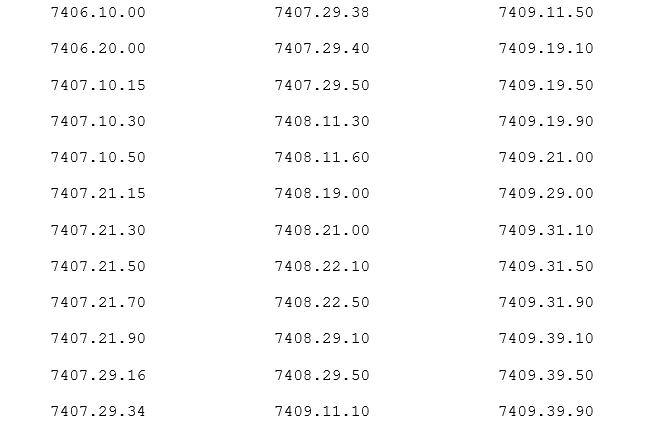
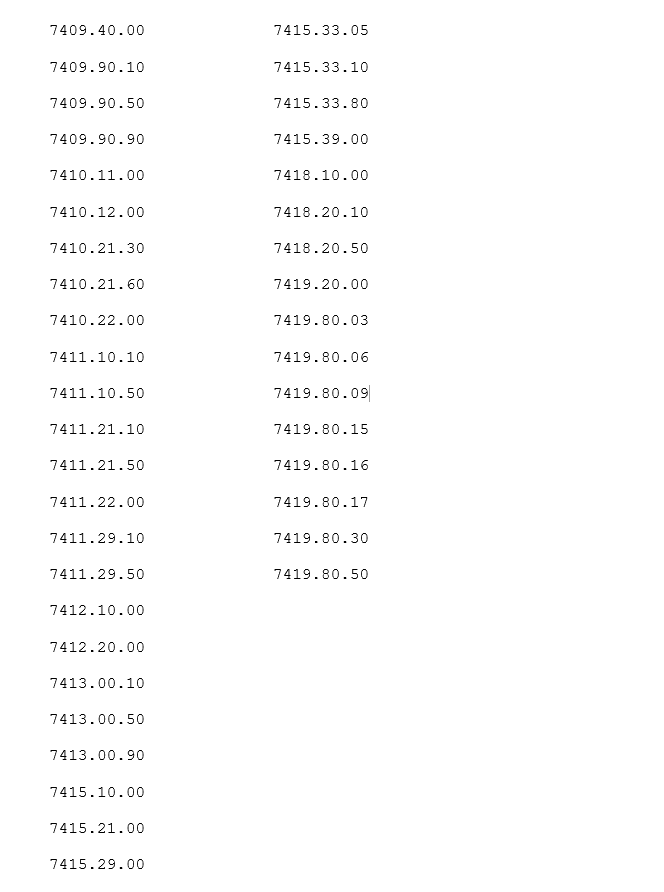
- U.S. note 2(v) to subchapter III of chapter 99 of the HTSUS is modified by:
- renumbering subdivision (xii) to (xiii);
- renumbering subdivision (xiii) to (xiv);
- deleting the first paragraph of subdivision (i) and inserting the following in lieu thereof:
“Except as provided in headings 9903.01.26–9903.01.33, in heading 9903.01.34, in heading 9903.96.01, and in subdivisions (v)(ii) through (v)(xiii) of this note, and other than products for personal use included in accompanied baggage of persons arriving in the United States, headings 9903.01.25, 9903.01.35, 9903.01.39, and 9903.01.43–9903.01.76 impose additional ad valorem rates of duty on imports of all products. Notwithstanding U.S. note 1 to this subchapter, all products that are subject to the additional ad valorem rate of duty imposed by these headings shall also be subject to the general rates of duty imposed under subheadings in chapters 1 to 97 of the tariff schedule. Except as provided in subdivisions (v)(ii) through (v)(xiii) of this note, all products that are subject to the additional ad valorem rates of duty imposed by these headings shall also be subject to any additional duty provided for in this subchapter or subchapter IV of chapter 99. Products that are eligible for special tariff treatment under general note 3(c)(i) to the tariff schedule, or that are eligible for temporary duty exemptions or reductions under subchapter II to chapter 99, shall be subject to the additional ad valorem rate of duty imposed by these headings except as provided in 9903.96.01 with respect to the Agreement on Trade and Civil Aircraft.”
- adding new subdivision (xii) in numerical order:
“The additional duties imposed by headings 9903.01.25, 9903.01.35, 9903.01.39, and 9903.01.43–9903.01.76 shall not apply to semi-finished copper and intensive copper derivative products provided for in 9903.78.01.”
- Heading 9903.01.33 is modified to delete the article description and insert the following in lieu thereof:
“Articles of iron or steel, derivative articles of iron or steel, articles of aluminum, derivative articles of aluminum, passenger vehicles (sedans, sport utility vehicles, crossover utility vehicles, minivans, and cargo vans) and light trucks and parts of passenger vehicles (sedans, sport utility vehicles, crossover utility vehicles, minivans, and cargo vans) and light trucks, semi-finished copper and intensive copper derivative products, of any country, as provided in subdivision (v)(vi) through (v)(xii) of note 2 to this subchapter”
- The article description of heading 9903.01.34 is modified by deleting “(v)(xii)” and inserting “(v)(xiii)” in lieu thereof.
- U.S. note 33(f) to subchapter III of chapter 99 of the HTSUS is modified by deleting the last sentence and inserting the following, in lieu thereof:
“All antidumping, countervailing, or other duties and charges applicable to such goods shall continue to be imposed in addition to the duty in heading 9903.94.05, except that entries of parts of passenger vehicles (sedans, sport utility vehicles, crossover utility vehicles, minivans, and cargo vans) and entries of parts of light trucks shall not be subject to: (1) the additional duties imposed on entries of semi-finished copper products and copper-intensive derivative products under heading 9903.78.01; (2) the additional duties imposed on entries of products of aluminum under headings 9903.85.02 and 9903.85.12; (3) the additional duties imposed on entries of derivative aluminum products under headings 9903.85.04, 9903.85.07, 9903.85.08, 9903.85.13, 9903.85.14, and 9903.85.15; (4) the additional duties imposed on entries of iron or steel products under headings 9903.81.87, 9903.81.88, 9903.81.94 and 9903.81.95; (5) the additional duties imposed on entries of derivative iron or steel products under headings 9903.81.89, 9903.81.90, 9903.81.91, 9903.81.93, 9903.81.96, 9903.81.97, 9903.81.98 and 9903.81.99; (6) the additional duties imposed on entries of articles the product of Canada under heading 9903.01.10; and (7) the additional duties imposed on entries of articles the product of Mexico under heading 9903.01.01.”
